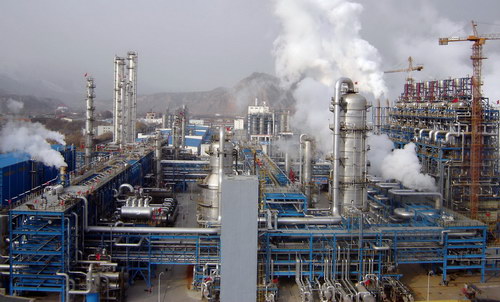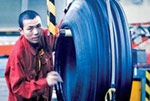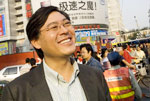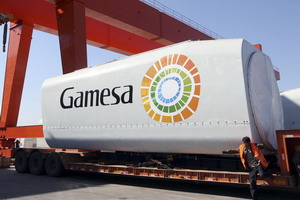Late to the party but happy to play catch-up
Updated: 2011-09-08 10:09
By Zhou Yan (China Daily)
|
|||||||||||
|
KBR's technology and equipment in use at an ethylene project run by a State-owned petroleum enterprise in Lanzhou, Gansu province. On KBR's blueprint for China, in the near term, are plans to conduct project delivery of offshore oil and gas platforms. [Photo/China Daily] |
Utt outlines his grand vision for making the most out of the burgeoning China market
BEIJING - It may come as a surprise to some highly paid corporate executives in China to learn that William Utt, one of the highest-paid chief executive officers on the Forbes list, had a Subway sandwich for lunch during his very first business trip to China.
As president and CEO of KBR Inc, a Houston-based engineering and construction company that was once a subsidiary of Halliburton Company, Utt's maiden tour to China was to show the importance of the emerging market to the company.
His trip also marked the very first visit by a KBR top executive to China in the company's more-than-100-year old history, even though it tapped into the market as early as 1972, when KBR provided eight sets of ammonia technology licenses and engineering design packages for China.
The company's regional office in China was established in Beijing in the same year. It focused solely on the technology unit among the company's total of 13 business divisions. Its coal gasification technology is one of its main technology offerings in China. The company has sold multiple technology licenses along with basic engineering packages.
In the last couple of years, KBR's technology business unit in China experienced annual growth of 20 percent. "We're proud of the position we've established in China. But we're also actually looking forward to growing even further to not only broaden our penetration in the technology market, but also to get into other areas in engineering and construction that would support our other business units at KBR," Utt, 54, said.
He admitted that the move has come late in the day when compared with some international contractors.
Perhaps it was this sense of urgency to catch up in the thriving Chinese market that kept him away from a decent traditional Chinese lunch.
After a short break on Sunday, Utt paid visits to China National Petroleum Corp (CNPC), the country's biggest energy company by market value, and the nation's top offshore oil producer - China National Offshore Oil Corp (CNOOC) - on Monday and then set off to Xi'an, capital city of northwestern China's Shaanxi province in the evening for a meeting with Shaanxi Yanchang Petroleum (Group) Corp, one of the four State-owned qualified companies for oil and gas exploration in China.
Utt said these visits to China's top oil firms were more political than purely business. "It's my role to spend time on establishing a political relationship with the country," he said.
"We have our aspiration (in China)," he said.
It was Chairman Mao Zedong himself, the founder of modern China, and Premier Zhou Enlai who facilitated the Houston-based company's presence in China in 1972 despite its low profile in the market.
"For those who have been in the petrochemical industry for several tens of years in China, the deal that KBR signed with the Chinese government in the 1970s is very well known. It also helped to deepen our trust in the company," said Zhang Jiyao, general manager of Shaanxi Yanchang Petroleum (Group) Corp.
The Shaanxi province-based petroleum company in June signed a contract with KBR to set up a joint venture on the basis of a technology called VCC, which is a slurry hydrocracking technology capable of converting heavy oil residues and coal into diesel fuel in an efficient way.
Utt witnessed the signing ceremony during his brief half-day stay in Xi'an city. It was the first joint venture for KBR in China.
Yanchang Petroleum's Zhang said the cooperation is testing the water to see if there are further opportunities for collaboration.
Even though KBR's history with China can be traced back some 40 years, it still found the going tough when the nation's economy took off and society started to rapidly modernize and industrialize, Zhang said.
Before revitalizing its efforts for a new foray into China, KBR experienced turbulence and corporate restructuring back in its home country in 2006, when its parent Halliburton started selling its stake in KBR through an initial public offering (IPO). That took place after KBR had aroused controversy on how the company, then called Kellogg Brown & Root, had become the US' biggest Iraq war contractor.
Utt was brought in to facilitate the separation and to set up KBR as a separate company.
What he found when he arrived was that most employees had a very good set of values but failed to perform as well as they should have. "People were very anxious to show the world that as a standalone company KBR could be a very great company, so we brought a lot of restructuring to the company at first," he said.














